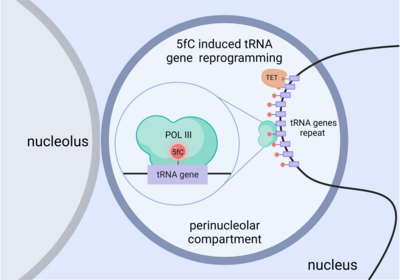Scientists find a new epigenetic switch that activates genes in embryonic development
The team of Prof. Christof Niehrs at the Institute of Molecular Biology (IMB) in Mainz, Germany, has discovered that a DNA modification called 5-formylcytosine functions as an activating epigenetic switch that kick-starts genes in early embryonic development. This finding proves for the first time that vertebrates have more than one type of epigenetic DNA mark and sheds new light on how genes are regulated in the earliest stages of development. Their findings were published in the journal Cell.
Our bodies are composed of trillions of cells, all working together to form a functional organism. Yet each of us started off as just a single fertilised egg cell. To become a whole human being, this single cell must multiply rapidly, forming all the correct organs in the right places. This process of development depends on hundreds of genes being activated at exactly the right time and place. The activation/deactivation of genes is controlled by so-called epigenetic modifications – chemical groups attached to DNA and its associated proteins that act like traffic lights to switch genes on or off.
For decades, scientists thought that vertebrates had only one type of epigenetic modification on DNA called cytosine methylation, which is associated with gene silencing. Ten years ago, three more chemical modifications were discovered in vertebrate DNA, but as they were only present in very small amounts scientists were uncertain if they were really functional epigenetic marks.
Now, Christof and his team have shown for the first time that one of these modifications, 5-formylcytosine (5fC), is involved in activating genes in early development. The discovery is significant because it proves that vertebrates have more than one type of epigenetic DNA mark and uncovers a new, previously unknown mechanism of epigenetic gene regulation.
In their study, the scientists looked at 5fC in frog embryos. Using microscopy and chromatography, they discovered that 5fC increases dramatically at the very start of development during a key step called zygotic activation when many genes become switched on. Eleftheria Parasyraki, the first author of the study, says “The observation of 5fC in microscopically visible tiny dots, or chromocenters, was exciting, and based on them we suspected that 5fC must do something important in early embryonic development”.
To prove that 5fC is an activating epigenetic mark, the scientists genetically manipulated enzymes in the embryo to increase or decrease the amount of 5fC on the DNA. Increasing 5fC resulted in increased gene expression while decreasing 5fC reduced gene expression, indicating that it was indeed the presence of 5fC on the DNA that activates genes.
Finally, the scientists also observed 5fC chromocenters in mouse embryos during zygotic gene activation. This suggested that 5fC likely acts as an activating epigenetic mark in both mammals and frogs.
Christof says “These findings are a real breakthrough in epigenetics because 5fC is only the second proven epigenetic DNA modification besides methylcytosine”.
The revelation that 5fC is an activating epigenetic regulator on DNA raises many questions as to how exactly it acts and what its role is beyond early zygotic genome activation. In particular, cancer cells can have very high amounts of 5fC. Additional studies on 5fC will be needed to answer these questions, which may ultimately help us to better understand how we develop and how gene regulation is disrupted in disease.
Further details
Further information can be found at https://doi.org/10.1016/j.cell.2024.08.011.
Christof Niehrs is a Scientific and Founding Director at IMB. Further information about research in the Niehrs lab can be found at www.imb.de/niehrs.
About the Institute of Molecular Biology gGmbH
The Institute of Molecular Biology gGmbH (IMB) is a centre of excellence in the life sciences that was established in 2011 on the campus of Johannes Gutenberg University Mainz (JGU). Research at IMB focuses on the cutting-edge fields of epigenetics, genome stability, ageing and RNA biology. The institute is a prime example of successful collaboration between a private foundation and government: The Boehringer Ingelheim Foundation has committed 154 million euros to be disbursed from 2009 until 2027 to cover the operating costs of research at IMB. The State of Rhineland-Palatinate has provided approximately 50 million euros for the construction of a state-of-the-art building and is giving a further 52 million in core funding from 2020 until 2027. For more information about IMB, please visit www.imb.de.
About Johannes Gutenberg University Mainz
Johannes Gutenberg University Mainz (JGU) is a globally recognized research-driven university with around 31,000 students from over 120 nations. Its core research areas are in particle and hadron physics, the materials sciences, and translational medicine. JGU's success in Germany's Excellence Strategy program has confirmed its academic excellence: In 2018, the research network PRISMA+ (Precision Physics, Fundamental Interactions and Structure of Matter) was recognized as a Cluster of Excellence – building on its forerunner, PRISMA. Moreover, excellent placings in national and international rankings as well as numerous honors and awards demonstrate the research and teaching quality of Mainz-based researchers and academics. Further information at www.uni-mainz.de.
Boehringer Ingelheim Foundation
The Boehringer Ingelheim Foundation is an independent, non-profit organization that is committed to the promotion of the medical, biological, chemical, and pharmaceutical sciences. It was established in 1977 by Hubertus Liebrecht (1931–1991), a member of the shareholder family of the Boehringer Ingelheim company. Through its funding programmes Plus 3, Exploration Grants and Rise up!, the Foundation supports excellent scientists during critical stages of their careers. It also endows the international Heinrich Wieland Prize, as well as awards for up-and-coming scientists in Germany. In addition, the Foundation funds institutional projects in Germany, such as the Institute of Molecular Biology (IMB) and the European Molecular Biology Laboratory (EMBL) in Heidelberg.
Press contact for further information
Dr Ralf Dahm, Director of Scientific Management
Institute of Molecular Biology gGmbH (IMB), Ackermannweg 4, 55128 Mainz, Germany
Phone: +49 (0) 6131 39 21455, Email: press(at)imb.de
